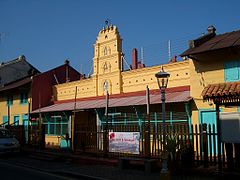Sri Poyatha Moorthi Temple
| Sri Poyatha Moorthi Temple | |
|---|---|
 |
|
| Name | |
| Proper name | Sri Poyatha Moorthi Temple |
| Geography | |
| Coordinates | 2°12′20″N 102°14′33″E / 2.205575°N 102.242448°ECoordinates: 2°12′20″N 102°14′33″E / 2.205575°N 102.242448°E |
| Country | Malaysia |
| State | Malacca |
| Location | No. 119 Jalan Gajah Berang |
| Culture | |
| Primary deity | Ganesha |
| Architecture | |
| Architectural styles | Chitty style simplified Dravidian architecture |
| History and governance | |
| Date built | 1781 |
| Creator | Thaivanayagam Chitty |
Sri Poyatha Moorthi Temple is the oldest Hindu temple in Malaysia and one of the oldest functioning Hindu temples in Maritime Southeast Asia. Located in the state of Malacca, the temple is one of the few existing Chitty temples in Malaysia.
The temple is situated on Jalan Tukang Emas, also known as "Harmony Street" because of its proximity to the Kampung Kling Mosque and Cheng Hoon Teng Temple.
The temple was built by Thavinayagar Chitty, the leader of the Chitty people, in 1781 after the Dutch colonial government of Malacca gave him a plot of land. The temple is dedicated to Vinayagar or Ganesha, the elephant deity. In the back room is a sculpture of the deity with the head of an elephant and the body of a man with four hands. There is another altar dedicated to Lord Muruga, the younger brother of Lord Vinayagar.
The Dutch colonial government in Malacca granted the Chitty community a piece of land, in the heart of Malacca City in 1780's. The land was located at Goldsmith Street, now known as Jalan Tokong, bearing Lot No. 62 Town Area XIU and measuring 15,879 square feet (1,475.2 m2) for the purpose of setting up a Hindu temple. The temple was built up in the year 1781 according to the date mentioned in the Dutch grant (freehold title). The temple was under the trusteeship of the late Mr. Thaivanayagam Chitty, who was then a leader of the Chitty community.
The simplification of culture and customs can be seen at the Sri Poyatha Moorthi Temple. Distinct from the South Indian temples, which have a complex Dravidian Architecture in the Pallava style, which displays carved out sculptures of the Hindu gods in many rows, the Chitty temple tend to only have one row, or a picture of one single god in each of the three rows, as evidenced in the Sri Poyatha Moorthi Temple.
...
Wikipedia

